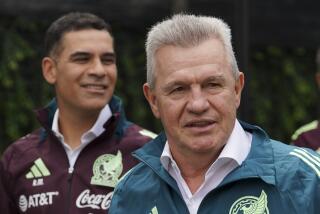For Mexico’s Javier Hernandez, World Cup is in the genes
- Share via
Reporting from Torreon, Mexico
Playing in the World Cup was never so much an option as it was an expectation for Javier Hernandez.
After all his dad was on the Mexican team in 1986, the last time El Tri made it to the World Cup quarterfinals. And his grandfather played in the 1954 tournament, scoring Mexico’s final goal.
But all that’s history, says Javier Aguirre, coach of this year’s Mexican team. The ghosts of World Cups past will have no effect in determining who makes Mexico’s roster for this summer’s tournament.
“The World Cup is in June. We’re in March. We don’t know who’s going to make it,” Aguirre said when asked about Hernandez’s status.
“He is working just like everyone else. We have to go through a selection process and pick out the best.”
In that case, count Hernandez in. Because as El Tri prepares to face North Korea on Wednesday night ( Telemundo, 8 p.m. PDT) in its first game on Mexican soil this season, no one has been near as good as the 21-year-old from Guadalajara.
In the opening match of Mexico’s pre-World Cup schedule, Hernandez had two goals and an assist in the first 22 minutes of a 5-0 win over Bolivia. And in a 2-0 victory over New Zealand at the Rose Bowl two weeks ago, he came off the bench in the second half to score one goal and narrowly miss another in his first 10 minutes.
“Javier is playing well,” conceded Aguirre, a teammate of Hernandez’s father on the 1986 Mexican team. But, he added, that doesn’t mean Hernandez can begin planning for South Africa just yet
“I don’t want to get ahead of myself, but at this point he has the same chances as everyone else. We’ll just have to wait,” Hernandez said.
That may be the diplomatic thing to say, but if Hernandez continues to play as he has since last fall, comments such as those will soon begin sounding ridiculous.
Hernandez was just 17 when he made his debut in Mexico’s Primera Division with Chivas of Guadalajara, the same club for which his father and grandfather played.
But he didn’t become a regular until Mexico’s 2009 Apertura, when he scored 11 of Chivas’ 23 goals in 17 games.
In this spring’s Clausura, he’s scored eight more times in nine contests. Add in his three goals in 90 minutes with the national team, and Hernandez has 22 goals in his last 29 games.
Which is why fans lined up outside the Mexican team’s hotel here Monday just to catch a glimpse of Hernandez as he exited the bus and headed for the lobby.
Yet it’s how he scores, in addition to how often, that makes Hernandez so valuable. A presence in front of the net who can score just as easily with his head as with his feet, he’s a classic Mexican striker in the style of Jared Borgetti and Carlos Hermosillo.
“First we have to wait and see if he’s selected. But if he is, I expect his level of play in these ‘friendly’ matches to continue in World Cup competition against South Africa, France and Uruguay,” Aguirre said, naming the teams Mexico will face in the first round.
North Korea, Wednesday’s opponent in the glistening new Territorio Santos Modelo stadium, is nowhere near that caliber. Although the Koreans have qualified for the World Cup for the first time since 1966, FIFA ranks the team 102nd in the world. And if recent matches are any indication, they aren’t getting much better.
Already this year the Koreans have lost to Iran and Venezuela and twice played Turkmenistan — ranked 130th by FIFA to ties in regulation. (North Korea won the second match on penalty kicks).
Which isn’t to say their World Cup preparations haven’t been eventful. For the first of two Venezuelan matches this month, Korea had to play in borrowed Venezuelan uniforms turned inside-out after their kits failed to show. Plus, the Koreans delayed the match two hours rather than play in the steamy 97-degree temperature. As a result, the match had to be suspended because of darkness with the score tied after 80 minutes.
A week earlier, North Korea’s match with Chile near Santiago was canceled following the deadly earthquake that struck the South American country.







